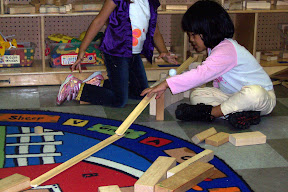"Are you ready?" (What I learned on my summer vacation: ramps, video conferencing with children, and climate)
By Peggy Ashbrook
Posted on 2010-08-16
Are you hearing that question too often from people who wonder how you are going to make the adjustment back to school now that we are into August? I used to say, “No, I’m not nearly ready” but have decided to follow a more positive model and say, “I’m getting there”. (I’m inspired by wording used by the Early Sprouts Garden Project science-gardening-nutrition-cooking curriculum developers, Dr. Karrie Kalich and colleagues. They have children taste the vegetables they grow and tell if they “like it a lot”, “like it a little”, or “didn’t like it yet.”)
Before the schools open up to teachers, I went to a “spa” for my brain, doing professional development through a training at the University of Northern Iowa. The UNI Regents’ Center for Early Developmental Education offers workshops designed for teachers of 3-year-olds to second grade through their Center for Early Education in Science, Technology, Engineering, and Mathematics (CEESTEM).
 One of the sessions was on “Ramps and Pathways” which Betty Zan and Rosemary Geiken wrote about in NAEYC’s journal, Young Children. The discussion among the participants was vibrant and informative, making me realize anew how important it is to have planning time with other teachers. Naptime meeting are not enough—we need to meet to do science inquiry ourselves so we will be prepared to support our students’ learning with questions that move them along in their thinking rather than get them to parrot the correct answer.
One of the sessions was on “Ramps and Pathways” which Betty Zan and Rosemary Geiken wrote about in NAEYC’s journal, Young Children. The discussion among the participants was vibrant and informative, making me realize anew how important it is to have planning time with other teachers. Naptime meeting are not enough—we need to meet to do science inquiry ourselves so we will be prepared to support our students’ learning with questions that move them along in their thinking rather than get them to parrot the correct answer.
While visiting relatives and talking with a neighbor I learned how useful video conferencing is for keeping young children in touch with their families. A niece talks nightly at bedtime with her son who is staying with the grandparents while she is completing her preservice training and the neighbor talks weekly with her granddaughter, reading books to her while the child eats breakfast and shows how she can get her shoes on.
 Beyond Penguins and Polar Bears posted an online primer for understanding climate–Climate Literacy in the Elementary Classroom by Susan M. Buhr and Mark S. McCaffrey with strategies for becoming climate-literate. They present a guiding principle—Humans can take actions to reduce climate change and its impacts—and seven Essential Principles beginning with, “The Sun is the primary source of energy for Earth’s climate system.” The positive wording teaches what we–teachers and our young students–can do.
Beyond Penguins and Polar Bears posted an online primer for understanding climate–Climate Literacy in the Elementary Classroom by Susan M. Buhr and Mark S. McCaffrey with strategies for becoming climate-literate. They present a guiding principle—Humans can take actions to reduce climate change and its impacts—and seven Essential Principles beginning with, “The Sun is the primary source of energy for Earth’s climate system.” The positive wording teaches what we–teachers and our young students–can do.
What has been your best formal or informal learning experience this summer?
Peggy
Disclaimer: The views expressed in this blog post are those of the author(s) and do not necessarily reflect the official position of the National Science Teaching Association (NSTA).


